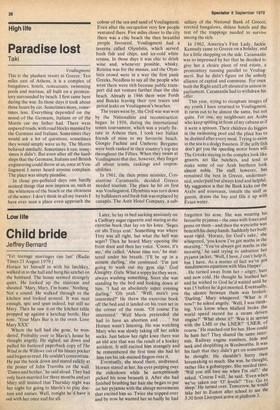High life
Paradise lost
Taki
Vouliagmeni This is the plushest resort in Greece. Ten miles east of Athens, it is a complex of bungalows, hotels, restaurants, swimming pools and marinas, all built on a promontory surrounded by beach. I first came here during the war. In those days it took about three hours by car. Sometimes more, sometimes less. Everything depended on the mood of the Germans, Italians or of the Morris car my father had. There were unpaved roads, with road blocks manned by the Germans and Italians. Sometimes they would ask a lot of questions, sometimes they would simply wave us by. The Morris behaved similarly. Sometimes it ran, sometimes it didn't. But even after all the hardships that the Germans, Italians and British engineering could throw at us, once at Vouliagmeni I never heard anyone complain. The place was simply paradise.
In those pre-polluted days one hardly noticed things that now impress us, such as the whiteness of the beach or the clearness of the water. I don't think in all my travels I have ever seen a place even approach the colour of the sea and sand of Vouliagmeni. Even after the occupation very few people ventured there. Five miles closer to the city there was a chic beach the then beautiful people favoured. Vouliagmeni had a taverna called Olymbitis, which served fresh fish and chips, and ice-cold white retsina. In those days it was chic to drink wine and, whenever possible, whisky. Retsina was for the masses, and the Olymbitis crowd were in a way the first punk Greeks. Needless to say all the people who went there were rich because public transport did not venture further than the chic beach. Already in 1946 there were Fords and Buicks leaving their tyre traces and petrol leaks on Vouliagmeni's beaches.
The years went by, the Civil war was won by the Nationalists and reconstruction began. In 1956, during the international tennis tournament, which was a yearly fixture in Athens then, I took two Italian friends of mine to my favourite beach. Giorgio Fachirki and Umberto Bergamo were both ranked in their country's top ten throughout the Fifties. When they swam at Vouliagmeni that day, however, they forgot all about tennis, rankings and responsibilities.
In 1961, the then prime minister, Constantine Caramanlis, decided Greece needed tourism. The place he hit on first was Vouliagmeni. Olymbitis was torn down by bulldozers and fresh fish was replaced by canapes. The Astir Hotel Company, a sub sidiary of the National Bank of Greece, erected bungalows, deluxe hotels and the rest of the trappings needed to survive among the rich.
In 1962, America's First Lady, Jackie Kennedy came to Greece on a holiday, and for a little shopping on the side. Caramanlis was so impressed by her that he decided to give her a choice piece of real estate, a promontory running parallel to Vouliagmeni. But he didn't figure on the unholy alliance of capital and commune. For once both the Right and Left shouted in unison in parliament. Caramanlis had to withdraw his offer.
This year, trying to recapture images of my youth I have returned to Vouliagmeni.
It turns out to be almost the same, but not quite. For one, my neighbours are Arabs who keep spitting in front of my cabana as if it were a spitoon. Their children do biggies in the swimming pool and the place has to be drained after every meal. Trying to swim in the sea is a dodgy business. If the jelly fish don't get you the speeding motor boats will. The Greeks staying in the complex look like grocers, act like butchers, and tend to make some of our Arab brethren look almost noble. The staff, however, has remained the best in Greece, undermanned, underpaid but always kind and helpful. My suggestion is that the Bank kicks out the Arabs and nouveaux, installs the staff as guests, drains the bay and fills it up with Evian water.


































 Previous page
Previous page